五年级作文英语课本剧
课本剧表演的经历与感悟英文作文
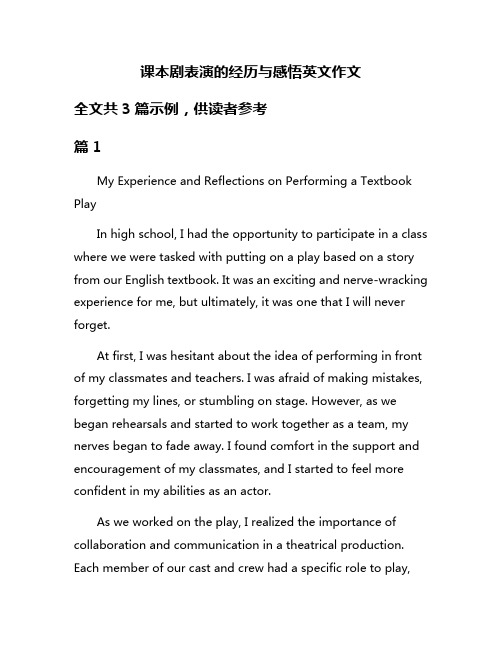
课本剧表演的经历与感悟英文作文全文共3篇示例,供读者参考篇1My Experience and Reflections on Performing a Textbook PlayIn high school, I had the opportunity to participate in a class where we were tasked with putting on a play based on a story from our English textbook. It was an exciting and nerve-wracking experience for me, but ultimately, it was one that I will never forget.At first, I was hesitant about the idea of performing in front of my classmates and teachers. I was afraid of making mistakes, forgetting my lines, or stumbling on stage. However, as we began rehearsals and started to work together as a team, my nerves began to fade away. I found comfort in the support and encouragement of my classmates, and I started to feel more confident in my abilities as an actor.As we worked on the play, I realized the importance of collaboration and communication in a theatrical production. Each member of our cast and crew had a specific role to play,and it was essential that we all worked together to bring the story to life. We spent countless hours rehearsing, blocking scenes, and fine-tuning our performances. It was a lot of hard work, but it was also incredibly rewarding to see our efforts come together on stage.The day of the performance arrived, and I was both nervous and excited. As I stood backstage waiting for my cue, I felt a rush of adrenaline and anticipation. When it was finally my turn to step onto the stage, I took a deep breath and reminded myself to stay focused and present in the moment.The play went off without a hitch, and the audience's applause at the end was the best reward for all of our hard work. In that moment, I felt a sense of accomplishment and pride in what we had achieved together. It was a unique and unforgettable experience that taught me valuable lessons about teamwork, dedication, and the power of storytelling.Looking back on my experience with the textbook play, I realize how much I have grown as a performer and as a person. I have gained confidence in my abilities, developed stronger communication skills, and learned the importance of working collaboratively towards a common goal. I am grateful for the opportunity to participate in such a meaningful and enrichingexperience, and I will carry the lessons I learned with me for years to come.In conclusion, my experience with performing a textbook play was one that I will always cherish. It taught me valuable lessons about teamwork, dedication, and the power of storytelling. I am grateful for the opportunity to have been a part of such a memorable and rewarding experience, and I look forward to pursuing more opportunities to perform and grow as an actor in the future.篇2My Experience and Reflections on Performing a Textbook DramaIn my sophomore year of high school, my English class was assigned the task of putting on a play based on a chapter from our textbook. The idea of performing in front of my classmates and teachers was daunting at first, but as we began to rehearse and prepare, I found myself embracing the opportunity to step out of my comfort zone and challenge myself.The play we chose to enact was a modern adaptation of Shakespeare's "Romeo and Juliet". I was cast as Juliet, a role that required me to delve into the emotional depth of the characterand convey her intense love and despair. As I started to memorize my lines and work with my fellow actors, I realized the power of collaboration and the importance of supporting one another to create a cohesive and engaging performance.The rehearsals were intense and demanding, but they were also filled with laughter and camaraderie. We spent hours perfecting our lines, blocking, and movements, and each day brought us closer together as a team. I was amazed at how we were able to bring the characters and the story to life through our actions and emotions, and I began to see the beauty and magic of theater.When the day of the performance arrived, I felt a mix of nerves and excitement. As we took the stage and the lights came on, I lost myself in the world of the play, fully immersing myself in the emotions and struggles of Juliet. The audience's reactions and applause at the end filled me with a sense of accomplishment and validation, knowing that our hard work had paid off.Looking back on the experience, I realize that performing in a textbook drama was much more than just an assignment; it was a journey of self-discovery and growth. I learned the importance of communication, teamwork, and dedication, and Igained a newfound appreciation for the art of storytelling and performance.Overall, my experience with the textbook drama has been unforgettable and transformative. It has instilled in me a passion for theater and a desire to continue exploring the world of acting and storytelling. I am grateful for the opportunity to have been a part of such a meaningful and impactful experience, and I look forward to future opportunities to perform and create art with others.In conclusion, performing in a textbook drama has been a highlight of my high school experience, and it has left me with lasting memories and valuable lessons that I will carry with me in the years to come. I will always cherish the moments spent on stage, bringing characters to life and connecting with my fellow actors, and I am grateful for the opportunity to have discovered a new passion and talent within myself.篇3My Experience and Insights on Performing Class PlayIn high school, I had the opportunity to participate in a class play, which was a memorable and enlightening experience for me. The play we performed was a modern adaptation ofShakespeare's famous tragedy, "Romeo and Juliet." Through the process of rehearsals, performances, and reflections, I gained valuable insights and lessons that have shaped my understanding of teamwork, creativity, and self-expression.First and foremost, participating in a class play taught me the importance of teamwork and collaboration. In order to put on a successful performance, each member of the cast and crew had to work together harmoniously, supporting and encouraging one another throughout the process. We spent countless hours rehearsing lines, blocking scenes, andfine-tuning our performances, all while learning to communicate effectively and compromise when necessary. Through this experience, I learned that collaboration is essential in achieving a common goal, and that by working together, we can achieve greatness.Furthermore, performing in a class play allowed me to tap into my creative side and explore new ways of self-expression. As I delved into my character and brought them to life on stage, I discovered a newfound sense of freedom and confidence in expressing myself through acting. I experimented with different voices, gestures, and emotions, pushing myself out of my comfort zone and challenging myself to embody a character thatwas vastly different from my own personality. This process of self-discovery and creative exploration was incredibly rewarding, and it showed me the power of art as a form of personal expression and communication.Moreover, participating in a class play gave me the opportunity to develop my public speaking and performance skills. Standing in front of an audience and delivering lines with conviction and emotion was a nerve-wracking experience at first, but through practice and perseverance, I learned to project my voice, make eye contact, and embody my character with confidence. I discovered the power of storytelling and the impact that a compelling performance can have on an audience, and I gained a newfound appreciation for the art of acting and storytelling.In conclusion, my experience of performing in a class play was a transformative and eye-opening journey that taught me valuable lessons about teamwork, creativity, and self-expression. Through this experience, I learned the importance of collaboration, the power of creativity, and the value ofself-expression through art. I will cherish the memories and insights gained from this experience, and I look forward to applying these lessons to future endeavors in acting and beyond.Performing in a class play was a formative experience that has enriched my life in countless ways, and I am grateful for the opportunity to have been a part of such a meaningful and unforgettable experience.。
课本剧表演英语作文80词
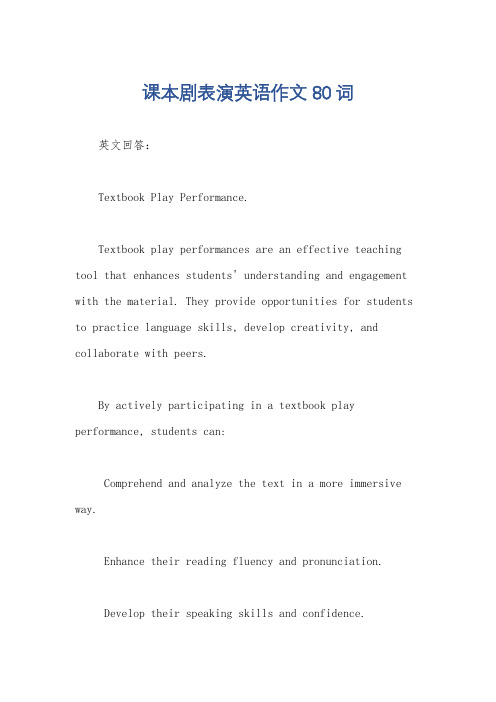
课本剧表演英语作文80词英文回答:Textbook Play Performance.Textbook play performances are an effective teaching tool that enhances students' understanding and engagement with the material. They provide opportunities for students to practice language skills, develop creativity, and collaborate with peers.By actively participating in a textbook play performance, students can:Comprehend and analyze the text in a more immersive way.Enhance their reading fluency and pronunciation.Develop their speaking skills and confidence.Foster teamwork and cooperation.Express their creativity and imagination.中文回答:课本剧表演。
课本剧表演是一种有效的教学工具,它能增强学生对教材的理解和参与度。
它为学生提供了练习语言技能、培养创造力和与同龄人合作的机会。
通过积极参与课本剧表演,学生可以:以一种更沉浸的方式理解和分析课文。
提高阅读流畅性和发音。
提高口语技能和自信心。
培养团队合作精神。
表达他们的创造力和想象力。
课本剧表演英语作文80词
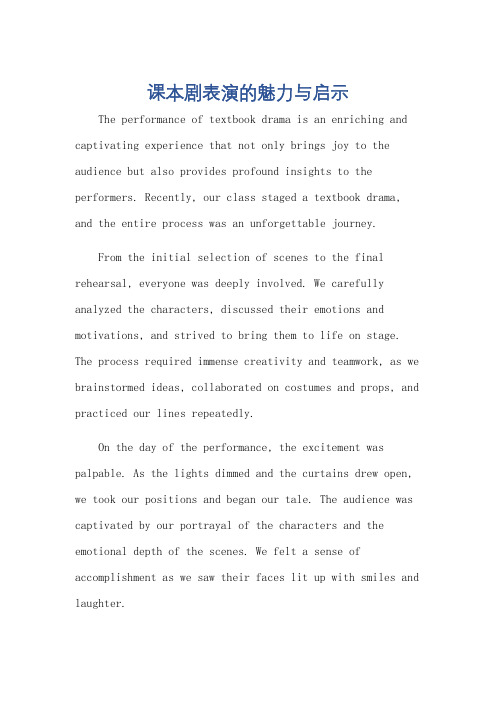
课本剧表演的魅力与启示The performance of textbook drama is an enriching and captivating experience that not only brings joy to the audience but also provides profound insights to the performers. Recently, our class staged a textbook drama, and the entire process was an unforgettable journey.From the initial selection of scenes to the final rehearsal, everyone was deeply involved. We carefully analyzed the characters, discussed their emotions and motivations, and strived to bring them to life on stage. The process required immense creativity and teamwork, as we brainstormed ideas, collaborated on costumes and props, and practiced our lines repeatedly.On the day of the performance, the excitement was palpable. As the lights dimmed and the curtains drew open, we took our positions and began our tale. The audience was captivated by our portrayal of the characters and the emotional depth of the scenes. We felt a sense of accomplishment as we saw their faces lit up with smiles and laughter.Moreover, the experience taught us valuable lessons about collaboration, communication, and creativity. It reminded us that teamwork is essential for achieving success, and that every individual contributes uniquely to the overall performance. Additionally, it fostered our ability to express ourselves creatively and to think critically about the content we were presenting.In conclusion, the performance of textbook drama was a transformative experience that not only showcased our talents but also instilled in us important life lessons. It was a celebration of the power of stories and the joy of theater, and we are eager to embark on similar adventuresin the future.**课本剧表演的魅力与启示**课本剧表演是一次丰富而迷人的体验,它不仅为观众带来了欢乐,也为表演者提供了深刻的启示。
别开生面的课本剧表演英语作文
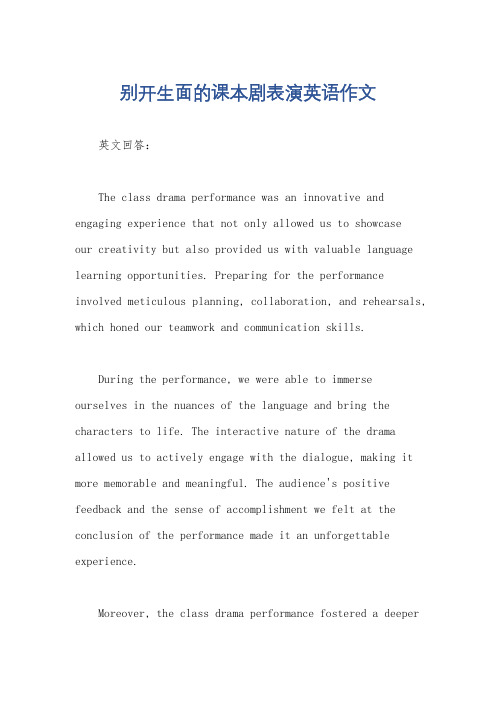
别开生面的课本剧表演英语作文英文回答:The class drama performance was an innovative and engaging experience that not only allowed us to showcaseour creativity but also provided us with valuable language learning opportunities. Preparing for the performance involved meticulous planning, collaboration, and rehearsals, which honed our teamwork and communication skills.During the performance, we were able to immerse ourselves in the nuances of the language and bring the characters to life. The interactive nature of the drama allowed us to actively engage with the dialogue, making it more memorable and meaningful. The audience's positive feedback and the sense of accomplishment we felt at the conclusion of the performance made it an unforgettable experience.Moreover, the class drama performance fostered a deeperappreciation for the cultural context of the language. By exploring different characters and perspectives, we gained insights into the values, beliefs, and customs of thetarget language community. This enriched our understandingof the language beyond its grammatical rules and vocabulary.Furthermore, the performance provided us with an opportunity to develop our presentation skills and overcome stage fright. It required us to project our voices clearly, articulate our words precisely, and convey emotions effectively. This not only improved our communication abilities but also boosted our confidence in speaking the language.Overall, the class drama performance was a highly beneficial and enjoyable learning experience. It allowed us to apply our language skills in a creative and meaningful way, while also fostering our teamwork, communication, and presentation abilities. It was an experience that not only showcased our talents but also contributed significantly to our language learning journey.中文回答:别开生面的课本剧表演是一次创新且引人入胜的体验,它不仅让我们展示了自己的创造力,还为我们提供了宝贵的语言学习机会。
课本剧《三调芭蕉扇》课本剧英语作文
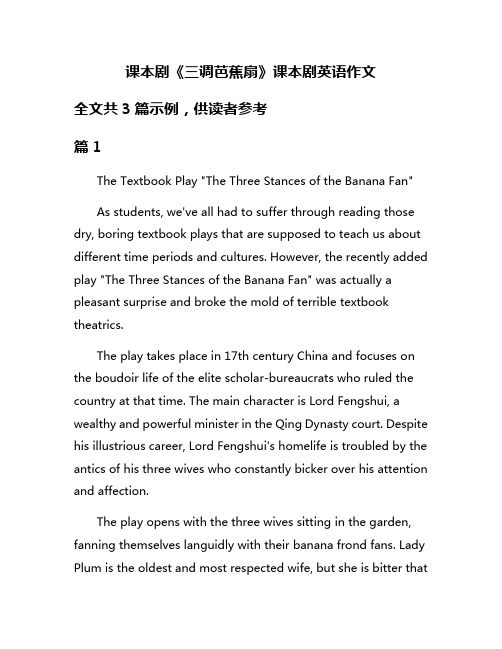
课本剧《三调芭蕉扇》课本剧英语作文全文共3篇示例,供读者参考篇1The Textbook Play "The Three Stances of the Banana Fan"As students, we've all had to suffer through reading those dry, boring textbook plays that are supposed to teach us about different time periods and cultures. However, the recently added play "The Three Stances of the Banana Fan" was actually a pleasant surprise and broke the mold of terrible textbook theatrics.The play takes place in 17th century China and focuses on the boudoir life of the elite scholar-bureaucrats who ruled the country at that time. The main character is Lord Fengshui, a wealthy and powerful minister in the Qing Dynasty court. Despite his illustrious career, Lord Fengshui's homelife is troubled by the antics of his three wives who constantly bicker over his attention and affection.The play opens with the three wives sitting in the garden, fanning themselves languidly with their banana frond fans. Lady Plum is the oldest and most respected wife, but she is bitter thatLord Fengshui seems to prefer the younger, more vibrant Lady Lotus. The youngest wife Lady Orchid is something of a schemer always trying to curry favor with her husband through excessive flattery and little gifts.The central conflict arises when Lord Fengshui announces that for his upcoming 50th birthday festival, he will award a prize to whichever wife can use her banana fan in the most unique and impressive "stance" or pose. This sparks an intense competition between the three wives who each want to win their husband's affection.Over the next few scenes, we see each wife attempting to master different fan stances and poses in the hopes of outperforming the others. Lady Plum takes a serious, traditional approach, diligently practicing the classic "Cloud Billows Over the Valley" stance. Lady Lotus decides to combine fan techniques with her prowess at traditional Chinese dance and choreographs an elaborate routine set to music. Meanwhile, the cunning Lady Orchid schemes to sabotage the other wives' efforts through little tricks and pranks.Despite their rivalry, there are also some humorous moments of solidarity between the wives, such as when they lament the difficulties of keeping their make-up pristine in thehot summer weather. There's also a funny scene where they get hopelessly entangled in a huge brawl after Lady Orchid's pet monkey runs away with Lady Plum's fan.The play reaches its climax on the night of Lord Fengshui's birthday festival. One by one, the wives take the stage to demonstrate their fan stances. However, there are some comedic mishaps - Lady Plum stumbles over her words while narrating the technical terms, Lady Lotus' choreography goes awry when one of her dancers forgets their steps, and Lady Orchid's special mechanisms meant to enhance her routine with flickering lights and puffs of smoke end up backfiring and causing a small explosion on stage.In the end, Lord Fengshui cannot decide which stance was the most impressive, so he crowns all three wives as co-winners, claiming he is blessed with a trio of talented beauties. The wives seem to put aside their differences, at least for one night, and come together in a rousing final dance number celebrating banana fandancing and marital bliss.While the plot was rather light and fanciful, the play actually taught me a lot about the domestic sphere of the 17th century Chinese elite. Scholarly ministers like Lord Fengshui were expected to keep multiple wives and concubines as a statussymbol. The complicated relationships and rivalries between these women made up much of the entertainment and drama within their social circles.The use of the banana fan as both an iconic prop and the central motif was very clever. These ornate fans made of layered banana fronds were an important instrument in the traditional fandancing artform that was all the rage among Chinese nobility at the time. The three distinct "stances" taken by the wives represented the different sub-styles of fandancing - Lady Plum's traditional, Lady Lotus' avant garde percussive routines, and Lady Orchid's showy pyrotechnic style.Fandancing itself was a major creative outlet for these high society ladies who led very restrictive, cloistered lives within the domestic sphere. Mastering the intricate moves and poses was a way for the wives to express themselves and distinguish their talents, much like the competition depicted in the play.Besides the fandancing component, I appreciated how the play highlighted the daily routines and power struggles found within the household staff structure. There was clearly a hierarchy among the wives with the favored ladies like Plum and Lotus enjoying certain privileges and luxuries that Orchid was excluded from. Their constant sniping at each other and "PearlClutching" about improper conduct reminded me of how heavily Confucian patriarchal values dominated social dynamics.The portrayal of the long-suffering Lord Fengshui as a doddering, oblivious fool subservient to his wives' whims was definitely played for comic effect. However, it likely revealed certain truths about how the men in power often indulged the excesses and tantrums of their pampered wives/concubines to keep the peace at home.Overall, while "The Three Stances of the Banana Fan" was certainly no profound masterpiece, I enjoyed it as a lighthearted comedic glimpse into a seldom explored facet of ancient Chinese culture. The fancifully absurd plot was entertaining enough to keep me engaged throughout. Yet the play also subtly educated about the domestic power structures, daily lifestyles,arts/hobbies, and strict social codes that governed the households of the Qing Dynasty aristocracy. I'd take a fun little nugget of edu-tainment like this over a dry historical lecture any day!篇2The Sandiaobazhangshan Play: A Riveting Journey Through Feudal ChinaAs a student of Chinese literature, I recently had the privilege of studying the captivating textbook play, "The Sandiaobazhangshan Play." This remarkable work, deeply rooted in the rich cultural tapestry of feudal China, has left an indelible mark on my understanding of the era's societal norms, values, and the intricate dynamics that governed interpersonal relationships.The play's plot unfolds against the backdrop of a feudal society rigidly structured by hierarchical relationships, where one's position and status dictated the course of their lives. The central character, Cui Yingying, a young woman of noble birth, finds herself caught in the unyielding grip of these societal constraints, her fate inextricably tied to the whims of those in power.From the outset, Cui Yingying's plight resonated deeply with me. Her forced betrothal to the wealthy but repulsive Zhang Sheng, a man she neither loved nor desired, was a poignant reminder of the limited agency women possessed in that era. The play's depiction of her anguish and resistance struck a chord, as I empathized with her struggle against the oppressive forces that sought to strip her of her autonomy.Yet, the play's true brilliance lies in its multifaceted exploration of the human condition, transcending the confines of gender and social status. The character of Cui Yingying's maid, Hong Niang, emerged as a beacon of loyalty and unwavering friendship, her actions a testament to the enduring power of human connection amidst adversity. Her clever schemes and unwavering devotion to her mistress exemplified the strength of the bonds that could exist between individuals, regardless of their disparate social standings.Moreover, the play delved into the complexities of love and desire, challenging the notion of societal propriety. The forbidden love between Cui Yingying and the scholar Zhang Gong, though taboo, was portrayed with a delicate touch, highlighting the universality of human emotions and the timeless struggle between duty and desire.As the narrative unfolded, I found myself captivated by the play's deft exploration of moral dilemmas and the consequences of actions. The character of Zhang Sheng, Cui Yingying's betrothed, initially presented as a one-dimensional villain, gradually revealed layers of depth and complexity. His descent into madness and eventual redemption through self-reflection challenged my preconceived notions, forcing me to confront thenuances of human nature and the capacity for growth and change.The play's poetic language and rich imagery further heightened my engagement, transporting me to a world where every word carried weight and every gesture held significance. The skillful use of metaphor and symbolism added depth and nuance to the characters' experiences, resonating with my own understanding of the human condition.Beyond its literary merits, "The Sandiaobazhangshan Play" offered a profound glimpse into the social fabric of feudal China. The intricate web of relationships, the delicate balance of power dynamics, and the intricate interplay between societal expectations and individual desires were brought to life with remarkable clarity. It challenged me to consider the complexities of that era, prompting me to reflect on the progress made in terms of individual freedoms and societal norms, while also acknowledging the enduring struggles that persist across generations.As I turned the final page of this remarkable work, I found myself profoundly moved and intellectually enriched. "The Sandiaobazhangshan Play" had not only captivated my imagination but had also ignited a deeper appreciation for thepower of literature to bridge cultural divides and foster empathy across time and space.In a world that often feels fragmented and disconnected, this textbook play served as a poignant reminder of our shared humanity, transcending the boundaries of geography and historical eras. It invited me to embark on a journey ofself-reflection, challenging my assumptions and broadening my perspectives on love, loyalty, and the enduring human spirit.As a student of literature, I am forever grateful for the opportunity to immerse myself in this timeless masterpiece. "The Sandiaobazhangshan Play" has left an indelible mark on my academic journey, inspiring me to delve deeper into the rich tapestry of Chinese literature and to approach each work with an open mind and a willingness to embrace the complexities of the human experience.篇3Textbook Play "The Banana Fan" - A Student's PerspectiveAs a high school student, we are often tasked with reading and analyzing textbook plays as part of our English literature curriculum. One such play that left a lasting impression on me was "The Banana Fan" by Chinese playwright Gao Xingjian. Atfirst glance, the title might seem peculiar and even humorous, but upon delving into the depths of this avant-garde work, I found myself captivated by its rich symbolism, experimental structure, and thought-provoking exploration of existential themes.The play revolves around a central character, simply referred to as "He," who finds himself in a seemingly absurd and dreamlike world where reality and illusion intertwine. The banana fan, a recurring motif throughout the play, serves as a symbolic representation of the fragility and impermanence of life. Its delicate folds and ephemeral nature mirror the fleeting nature of human existence, challenging the audience to ponder the transience of our experiences and the futility of grasping onto material possessions.One of the most striking aspects of "The Banana Fan" is its nonlinear narrative structure. Gao Xingjian masterfully weaves together a tapestry of fragmented scenes, each one offering a glimpse into the protagonist's psyche and the surreal landscape he inhabits. This unconventional approach to storytelling demands active engagement from the reader, forcing us to piece together the puzzle and derive our own interpretations from the scattered fragments.The language employed in the play is equally captivating, blending poetic imagery with philosophical musings. Gao Xingjian's use of metaphors and symbolism is truly remarkable, inviting us to peel back the layers of meaning and uncover the deeper truths hidden beneath the surface. The dialogue, often cryptic and enigmatic, challenges our conventional notions of communication, prompting us to question the very nature of language and its ability to convey the complexities of human experience.Throughout the play, the protagonist grapples with existential questions, confronting the inherent loneliness and isolation that permeate our existence. The recurring motif of the banana fan serves as a poignant reminder of our mortality, forcing us to confront the impermanence of life and the inevitability of change. Gao Xingjian's exploration of these profound themes resonates deeply, encouraging us to reflect on our own journeys and the fleeting nature of the world around us.One of the most compelling aspects of "The Banana Fan" is its ability to evoke a sense of disorientation and unease within the reader. The surreal landscapes and dream-like sequences challenge our perceptions of reality, forcing us to question the boundaries between the tangible and the abstract. Thisdiscomfort, however, is not merely a literary device; it is a deliberate attempt by the playwright to shake us from our complacency and compel us to reevaluate our assumptions about the world we inhabit.Ultimately, "The Banana Fan" is a profound andthought-provoking work that defies easy categorization. It is a play that demands active engagement from its audience, challenging us to question our preconceived notions and embrace the ambiguity and complexity of human existence. As a student, grappling with this unconventional and avant-garde piece was both mentally stimulating and intellectually rewarding, forcing me to stretch the boundaries of my critical thinking and analytical skills.In conclusion, Gao Xingjian's "The Banana Fan" is a remarkable literary achievement that has left an indelible mark on my understanding of literature and the human condition. Its experimental structure, symbolic richness, and existential musings have challenged me to embrace the fluidity of meaning and the ever-changing nature of our world. As I continue my academic journey, I carry with me the lessons imparted by this extraordinary play, a testament to the enduring power of art to provoke, inspire, and transform our perspectives.。
课本剧表演的经历与感悟英文作文

课本剧表演的经历与感悟英文作文全文共6篇示例,供读者参考篇1My Experience and Insights from a Classroom PlayHi everyone! Today, I want to share with you my amazing experience of participating in a classroom play. It was so much fun, and I learned a lot from it. Let me tell you all about it!Our teacher, Miss Johnson, decided that our class should perform a play based on a story from our English textbook. We were all excited and eager to be part of it. The play was called "The Magical Adventure," and it was about a group of friends who go on a journey to find a magical treasure.First, we had auditions to determine who would play which character. I auditioned for the role of the main character, Tim, and to my delight, I got the part! There were other important roles too, like Sally, the brave girl, and Max, the funny sidekick. We all practiced our lines and rehearsed the play together.During the rehearsals, we faced some challenges. Remembering our lines was difficult at first, but with time andpractice, we became more confident. We also had to work on our expressions, gestures, and timing to make the play more engaging for the audience. Miss Johnson guided us through the process, teaching us how to project our voices and use our bodies to convey emotions.Finally, the big day arrived. We were all dressed up in colorful costumes and ready to perform. The classroom was transformed into a magical stage with props and decorations. Our families and fellow students filled the room, waiting excitedly for the play to begin.As the curtains opened, I felt a mix of nervousness and excitement. It was showtime! We delivered our lines, sang songs, and danced on stage. The audience clapped and cheered for us, which made us feel proud and motivated.After the play, Miss Johnson gathered us all together for a reflection session. We discussed what went well and what we could improve upon. One thing I realized was the importance of teamwork. Each of us had a role to play, and we had to support and rely on one another to make the play a success. We also learned that practice and perseverance are essential. Even if we made mistakes during the rehearsals, we kept trying until we got it right.Participating in the classroom play taught me many valuable lessons. I learned about the importance of preparation, dedication, and collaboration. It helped me boost myself-confidence and overcome stage fright. I also discovered my love for performing and entertaining others.In conclusion, being part of a classroom play was an incredible experience for me. It allowed me to explore my talents, learn new skills, and create lasting memories with my classmates.I am grateful to my teacher and classmates for their support and encouragement. I can't wait for our next performance!Word Count: 436 words篇2当然可以!以下是一篇关于小学生参与课本剧表演经历与感悟的英文作文,符合你所要求的长度为2000个字。
课本剧表演英语作文
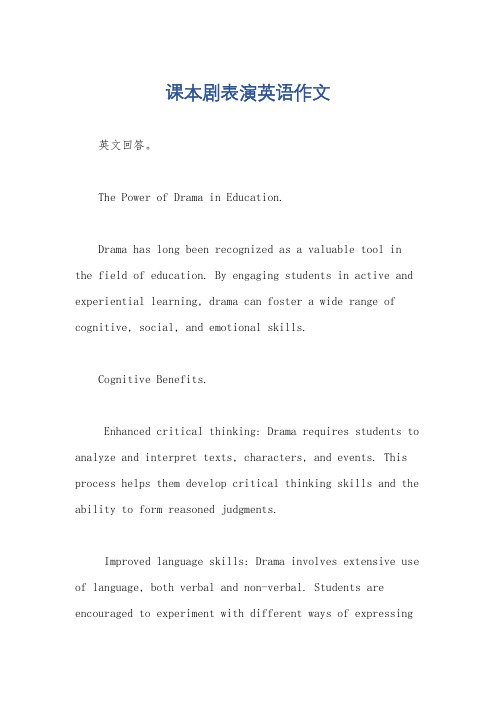
课本剧表演英语作文英文回答。
The Power of Drama in Education.Drama has long been recognized as a valuable tool in the field of education. By engaging students in active and experiential learning, drama can foster a wide range of cognitive, social, and emotional skills.Cognitive Benefits.Enhanced critical thinking: Drama requires students to analyze and interpret texts, characters, and events. This process helps them develop critical thinking skills and the ability to form reasoned judgments.Improved language skills: Drama involves extensive use of language, both verbal and non-verbal. Students are encouraged to experiment with different ways of expressingthemselves, which can enhance their vocabulary, grammar, and communication abilities.Increased creativity: Drama encourages students to use their imaginations and explore different perspectives. This can stimulate creativity and lead to innovative solutions to problems.Social and Emotional Benefits.Empathy and perspective-taking: By stepping into the shoes of different characters, students develop empathy and the ability to understand the perspectives of others. This can help them become more tolerant and compassionate.Collaboration and teamwork: Drama is a collaborative activity that requires students to work together. This can teach them important skills such as cooperation, communication, and conflict resolution.Self-confidence and resilience: Drama provides a safe and supportive environment for students to take risks andstep outside their comfort zones. This can help them build self-confidence and resilience.Incorporating Drama into the Classroom.There are many ways to incorporate drama into the classroom. Some common approaches include:Role-playing exercises: Students can role-play historical events, literary characters, or real-life situations. This can help them understand different perspectives and develop problem-solving skills.Dramatic storytelling: Students can create and perform their own stories. This can encourage creativity, language development, and communication skills.Interactive theater: Students can participate in interactive theater productions that involve audience participation. This can help them develop their social and communication skills.Conclusion.Drama is a powerful tool that can enhance students' cognitive, social, and emotional development. By incorporating drama into the classroom, educators cancreate a more engaging and effective learning environment that empowers students to succeed in all areas of their lives.中文回答。
五年级课本剧搞笑场面作文
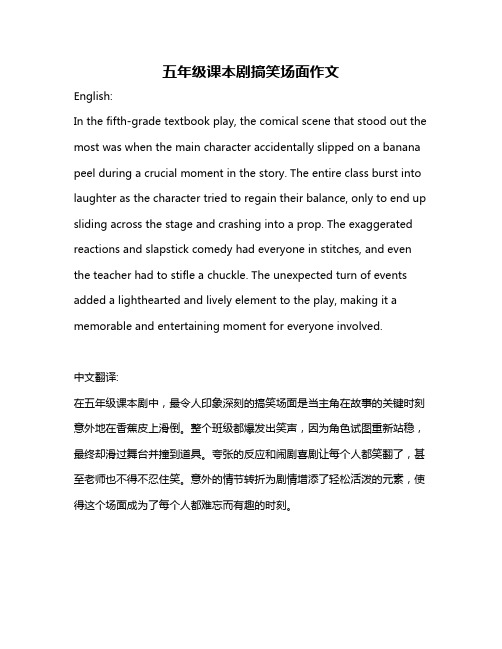
五年级课本剧搞笑场面作文English:In the fifth-grade textbook play, the comical scene that stood out the most was when the main character accidentally slipped on a banana peel during a crucial moment in the story. The entire class burst into laughter as the character tried to regain their balance, only to end up sliding across the stage and crashing into a prop. The exaggerated reactions and slapstick comedy had everyone in stitches, and even the teacher had to stifle a chuckle. The unexpected turn of events added a lighthearted and lively element to the play, making it a memorable and entertaining moment for everyone involved.中文翻译:在五年级课本剧中,最令人印象深刻的搞笑场面是当主角在故事的关键时刻意外地在香蕉皮上滑倒。
整个班级都爆发出笑声,因为角色试图重新站稳,最终却滑过舞台并撞到道具。
夸张的反应和闹剧喜剧让每个人都笑翻了,甚至老师也不得不忍住笑。
意外的情节转折为剧情增添了轻松活泼的元素,使得这个场面成为了每个人都难忘而有趣的时刻。
- 1、下载文档前请自行甄别文档内容的完整性,平台不提供额外的编辑、内容补充、找答案等附加服务。
- 2、"仅部分预览"的文档,不可在线预览部分如存在完整性等问题,可反馈申请退款(可完整预览的文档不适用该条件!)。
- 3、如文档侵犯您的权益,请联系客服反馈,我们会尽快为您处理(人工客服工作时间:9:00-18:30)。
五年级作文英语课本剧【篇一:英语剧本的写作及格式】剧本的写作及格式(期中第9周口试时须上交的剧本,并计入口试成绩的一部分)请提前将以下事情告知学生,以方便学生做准备。
1)封面3)扉页3)附表此表为小组打分表,须放在剧本之后。
4)内容要求本部分须用英语描述。
1. introduction of the play1) background(本部分描述不少于5句话) 2) the characters (每个人物描述不少于3句话) the old lady(人物描述不少于3句话): myra(人物描述不少于3句话): enid(人物描述不少于3句话):mrs. morrison(人物描述不少于2句话):jonnie(人物描述不少于2句话):mrs. grant(人物描述不少于2句话):the postman (人物描述不少于2句话): 3) the plot ideas(本部分描述不少于10句话)5)表演要求时间长度:根据班级人数,总的表演时间尽量控制在2节课(90分钟)内。
原则上,每组表演时间不少于6分钟。
每组人数:一般为每组4人。
特殊情况需要增加小组人数的,请任课教师斟酌决定。
角色的分配:the old lady:1人扮演 myra:1人扮演enid, mrs. morrison, mrs. grant:同1人扮演 jonnie, the postman, narrator:同1人扮演6)评分项目剧本20%,工作表现5%,突出贡献5%,服装道具5%,创新性5%,适切性15%,准确性15%,语言范围15%,话语长短15%。
其中,工作表现、突出贡献由小组同学打分。
工作表现须至少分出两等;突出贡献每组选出1名同学,如在剧本撰写、组织表演方面点子多、工作做得多的同学。
6) the scripts model:1int. william wall high school - hallway - day 1as we wind down the crowded hallway in this typical american high school...1a another corridor 1a...we hear all the sounds of a standard porno flick, from the unenthusiastic screams of fake ecstasy to the cheesy music. 1b int. william wall high school - auditorium - day 1bthe sounds echo in the empty hall. behind the stage a light from an open door...matt (o.s.)this is unwatchable. its not even in focus. and geez, look, the boom mike is in the shot. this is really shoddy work.1cint. william wall high school - a/v room - day 1cthe door leads into this room, as we continue on to a tv monitor displaying a sweaty guys ugly face.deacon (o.s.)why do they always show the guys face?its like, cant we just assume hesenjoying it?fred (o.s.)because theyre trying to make us feel like were better looking than that guy, so we should be able to get chicks as hotas her.deacon (o.s.)how the hell do you know?fred (o.s.)its a basic rule of porno.finally, we reveal our three heroes: matt, fred, and deacon.theyre watching the porno...2int. william wall high school - a/v room - day 2... before school with the sound turned way down, but you can still hearthe porno. the three guys are sitting with their book bags on their laps to conceal any possible bonerage.deacon (v.o.)it all started on my seventeenth birthdaywith our usual morning routine.freddeacon! what are you doing? i waswatching that.…【篇二:精彩的课本剧】精彩的课本剧五年级八班扈元灏今天,我们来到了学校五楼展演厅看课本剧,一进去,就有一种清爽在里面,还有一丝激动。
我们一共看了9个课本剧,分别是《中华少年》《小红帽》《精彩极了和糟糕透了》《叮咚小镇》《美丽的小路》》《小青虫的梦》等。
这些课本剧一个比一个精彩,《中华少年》中的演员说的话津津有味,演的人物栩栩如生。
《小红帽》中的大灰狼凶恶的形象展现的非常生动。
《精彩极了和糟糕透了》是讲的一个人在生活中要有鼓励的力量和严厉的力量,这两种力量都是一个共同出发点------那就是爱!《叮咚小镇》讲的是个小偷的故事,他们没有食物没有水喝,只好去偷别人的东西,最后被警察抓住了,然后他们3个认识了错误,洗清了罪名,成了一名合格的叮咚小镇人。
其中最让我感动和启发的就是《精彩极了和糟糕透了》是先写了巴迪七八岁时写的第一首诗,母亲的评价是精彩极了,父亲的评价是糟糕透了,再写作者几年后认识到父亲的评价是对的,最后写成年以后的巴迪,越来越体会到父亲母亲截然不同的评价在生活中的作用。
我看了这个课本剧,觉得爱可以用两种力量来平衡,如果只有慈祥的爱,那么你可能被引入歧途,所以应该有严厉的爱时刻来警告提醒你:小心、注意、总结、提高。
最后巴迪成了一个大作家。
我在看完课本剧后有许多感受,最重要的就是我明白了,爱是可以用许多种不同的方式来表现的,爱让我们健康成长!指导教师:范振华【篇三:小红帽中英文剧本-最新版-3.20】第一场:小红帽家小红帽:hello everyone, i’m alice. my grandma gave me a little red riding hood for my birthday, i like it very much and wear it wherever i go,so people call me little red riding hood.(大家好,我是alice. 我外婆在我生日那天送了我一个小红帽,我去哪儿都喜欢带着它,大家都叫我小红帽)妈妈: (妈妈拿着一个篮子,把桌子上的水果放在篮子里)小红帽唱着歌,欢快地跑进来)hi, mum. wow, apples, orange, peach, mango, and strawberry, so many kinds of fruits. what are you doing mum? 你好,妈妈。
哇哦,这么多水果啊。
你在干什么呀?妈妈:(一边把水果放在篮子里,心事重重地说)grandma is ill. the fruit and cakes are for grandma. (外婆病了,这些水果和点心是要送给外婆的)小红帽:(边提起篮子,边点头说)oh, sorry to hear that. mum, let me bring them to grandma! (好的,我把吃的带给外婆)妈妈:(亲切地看着小红帽说) ok, but hurry dear. grandma must be very hungry. be careful and remember don’t talk to strangers.(好的,快去吧,外婆肯定饿了。
l路上小心点,记住别和陌生人说话)小红帽:don’t worry mum, i’ll remember. goodbye.(好的,我记住了,别担心,再见妈妈)妈妈: bye-bye.darling.再见亲爱的。
第二场:在路上(一阵轻快的音乐由远而近,小红帽挎着篮子蹦跳跳地跳到花草旁)小红帽: wow!flowers, how beautiful! i can take some flowers for grandma. she will be happy to see the flowers. oneflower ,two flowers, three flowers. 哇,好漂亮的花呀,外婆见到这些花,肯定会很开心的,(放下篮子采花)一朵,两朵,三朵大灰狼:(随着一阵低沉的音乐,大灰狼大步地走上台)i am a wolf.i’m hungry. i need food to eat.(我是大灰狼我很饥饿,我得找点吃的) (做找东西状,东张西望)oh,wonderful. here is a little red riding hood. aha, i will pretend to be nice first.(太好了,这儿有个小红帽,我要先假装是个好人) hi! little red riding hood. where are you going in such a hurry? 嘿小红帽你这么急匆匆的去干什么呀?(做狡猾的样子和小红帽打招呼)小红帽:eh, the wolf seems like a good person, maybe... maybe...i can tell him?i’m going to visit grandma.grandma is ill.(对自己说道,这只狼看起来像个好人,我应该可以告诉她)(手摸辫子,天真地回答,去看望外婆,外婆病了)大灰狼:oh i see. you must be a very nice girl. does your grandma live far?(哦,我知道了,你真是一个好心的姑娘。
